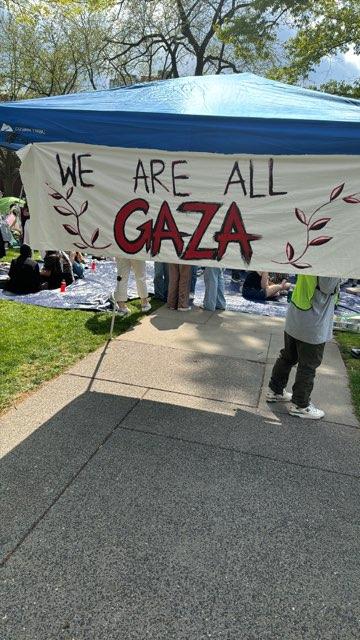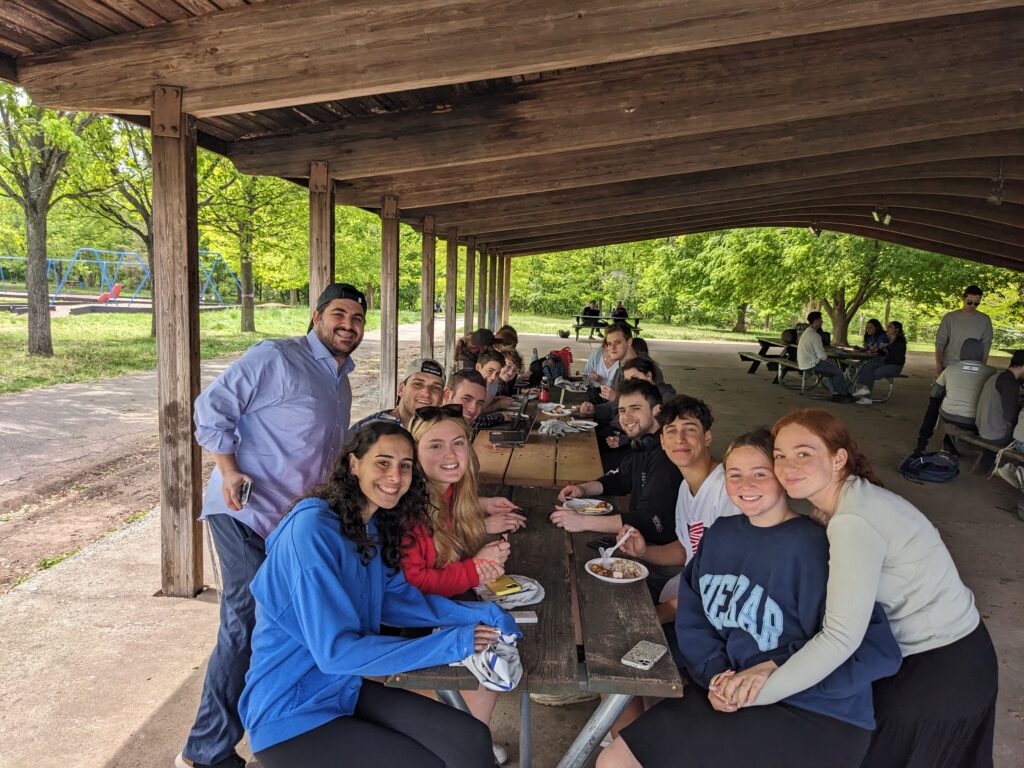
Rutgers University, which has been hit with federal investigations over its alleged failure to protect Jewish students, defused a potentially confrontational situation by negotiating the end of a pro-Palestinian encampment, but has come under fire for agreeing to consider some of the protestors’ demands.
The encampment was peacefully dismantled by students on the university’s main campus in New Brunswick on May 2 after word that they planned to cause a classroom disruption forced the postponement of finals scheduled to take place before noon. That prompted the university to order the encampment, which had been on Voorhees Mall for four days, be gone by 4 p.m. However, the students agreed to leave only after the university entered into negotiations with students and agreed to consider a number of demands, including divestiture from Israel, that have shocked the Jewish community.
“I think some of the demands that are even being considered are dangerous,” said Harris Laufer, director of the Jewish Federations of New Jersey, particularly the demand that the university divest from Israel.
He noted “dangerous appeasement” has long shown to be an ineffective tool to counter threats and violence.
“I think putting divestiture on the table is dangerous and it also is directly contrary to state law,” he said and questioned the double-standard the university was using in applying rules of conduct.
“You can do an encampment and get final exams canceled and that is okay, but you can’t cheat on those exams or on a paper?” he asked and said while he was on campus May 2 he had heard from many Jewish students who were afraid to wear Star of David necklaces or kippahs and encountered others holding up flags of terrorist organizations and yelling antisemitic slurs.

Of the 10 demands made by protestors eight will be given some consideration by the university. Rutgers said the demand that it end its memorandum of understanding with Tel Aviv University to establish the Israeli educational institution as part of the Innovation and Technology Hub under construction in New Brunswick “was a matter of scholarly inquiry” and that the divestiture from Israel was “undergoing a review process.”
However, University President Dr. Jonathan Holloway had already rejected a 56-page request made weeks before by the Endowment Justice Collective regarding those demands.
It did agree to develop an Arab Cultural Center, agreed to work with a committee to bring 10 displaced Gazan students to the university to finish their education and to establish a memorandum of understanding to establish a long-term educational partnership with Birzeit University in the West Bank as established by the precedent of William Paterson University. However, that collaboration was put on hold by that state institution after it drew fire and threats of legal action because of Birzeit’s support of the Boycott Divestment Sanctions (BDS) campaign against Israel and its student governing body’s support of Hamas.
Among the other agreement initiatives is that Rutgers will work to develop training sessions on anti-Arab and anti-Muslim bias for administrators and staff and provide amnesty for students, faculty and staff who participated in the demonstration, although some individuals who participated in acts of bias or harassment may be subjected to action under the school’s disciplinary code.
The agreement brought both relief that the university did not erupt in the violence seen at so many other campuses and sharp criticism that the administration gave in to demands. The encampment was dismantled peacefully as faculty members surrounded it to protect students.
“Many of us were shocked yesterday by the shameful, disgraceful, pathetic and reprehensible capitulation to lawbreaking Jew-haters at Rutgers University,” wrote Jewish Federation of Greater MetroWest CEO Dov Ben-Shimon in a statement on May 3.
“There appear to be no consequences for vandalism, destruction, hate-speech, intimidation or academic ignorance,” he said, pointing out that nothing was ever said about how the Hamas-Israel war started and the Israeli hostages, rape and murder victims and “a vicious Islamicist ideology that hates Jews (and Americans and the West).”
Rutgers Chabad Executive Director Rabbi Yosef Carlebach said he believed there was enough evidence to conclude that “rabble-rousers from New York and others from outside” the university helped to instigate the encampment. “I think we need to work together as a community to demand Rutgers acts responsibly,” he said, adding that he believed “many of these kids have zero clue” about the meaning of colonization and other things they were protesting.
Rabbi Carlebach said Chabad continues to have ongoing regular communications with Rutgers Police, administrators and county law enforcement.
By the late afternoon of May 2 the campus was peaceful. Walking along College Avenue students were seen hanging out and studying and rock music was blaring from frat houses.

However, interviews with students at Hillel and Chabad revealed much of the trauma they had experienced in the previous weeks and months.
Maayan Schlissel, a rising sophomore mechanical engineering major from Elizabeth, said she witnessed the tensions rising when she returned from Passover. Wearing hanging Israeli flag earrings she showed a photo on her phone of a “blood libel” poster claiming that Israel had prevented covid vaccinations in Gaza, allowing the disease to continue killing Palestinians. It claimed demonstrators were wearing masks in support of Palestinians dying of covid.
“They were chanting all Zionists were racists and that they’re taking back their university,” said Schlissel, adding she saw many people leaving the encampment who were not part of the university.
Lior Duerr, a rising sophomore meteorology major from Englewood, said he had not experienced a lot of hatred aimed at him, but knew of others who had heard such invectives as “Hitler was right.”
Shalhevet Adler, a rising sophomore exercise science and pre-physical therapy major from Tenafly, said she was walking with a friend down College Avenue when someone advocating for divestment yelled at her friend that she was a snake.
Nechama Friedman of Highland Park said as she ate dinner at Chabad she had gone earlier to the encampment expecting a large police presence and watched the protestors leave peacefully although one called out, “F———Zionists.” Several weeks earlier she was walking with someone wearing apparel with an Israeli flag and someone yelled “white supremacists.”
Matthew Levine, a data analytics and supply chain major from Fair Lawn, said despite wearing tzitzit and a kippah he has had little said to him, although he had known others who had been spit on.
“Everybody talks about how Rutgers is a terrible place, but our Chabad and Hillel have made this a great place,” he said. “Chabad is a shelter.”
Debra Rubin has had a long career in journalism writing for secular weekly and daily newspapers and Jewish publications. She most recently served as Middlesex/Monmouth bureau chief for the New Jersey Jewish News. She also worked with the media at several nonprofits, including serving as assistant public relations director of HIAS and assistant director of media relations at Yeshiva University.









